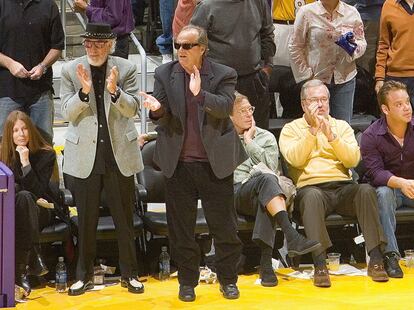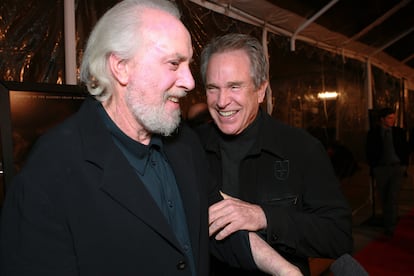Don Vito Corleone has left the family in the hands of his youngest son, Michael. And he fears a coup that will wipe them all out. So, sitting on a chair in his garden, he warns his son: “Someone you trust will propose a meeting.” And then he describes the betrayal that the Corleone family will, in fact, eventually suffer. That sequence of events The Godfather, The key to understanding the plot of the film and the behavior of the mob, was not in Mario Puzo’s book, but was written by Robert Towne at the request of Francis Ford Coppola, who mentioned him and paid tribute to him when he collected the Oscar for best adapted screenplay. Because Towne, who died on Monday at the age of 89 in his home in Los Angeles, was the key man in the writing of New Hollywood films, and the screenwriter to whom the studios turned for decades to unblock meaningless scripts and blockbusters in need of dramatic elements.
Review Towne’s filmography, which won the Oscar with Chinatown, and was a candidate with The last duty, Shampoo and Greystoke: The Legend of Tarzan, King of the Apes, does not serve to fully understand the importance of his figure. Because in the seventies and eighties he was the script doctor —a writer who anonymously touches up a script that is missing a simmer— is the most popular and hired actor in Hollywood. In 2017, Vulture placed Towne at number three on its list of the 100 greatest screenwriters of all time, behind only Billy Wilder and Joel and Ethan Coen. In the same magazine, He said: “All scripts are rewritten. The only question is whether it is a good or bad rewrite. In general, it is better to have a reputation for fixing things.”
Born Robert Bertram Schwartz in San Pedro, home of the Port of Los Angeles, in 1934, his father owned a women’s clothing store and, in order to make the business prosper (which it didn’t), he changed his last name to Towne. He enjoyed cinema because there was a Warner Bros. studio near his home, and after graduating in 1956 with a degree in English Literature and Philosophy from Pomona College, he studied acting with his college friend Richard Chamberlain. There he met Jack Nicholson. However, before beginning his career as a screenwriter, he worked for a time on a tuna boat.
His film career began, like many of his generation, under the wing of Roger Corman in his B-movie production company (he wrote The last woman on Earth), and on television, in the series The UNCLE Agent and in the program The Lloyd Bridges Show. Until one day in his psychiatrist’s office he met another patient, Warren Beatty, who at that time was dealing with his discontent with the script of Bonnie and Clyde. At its premiere in 1967 his name did not appear. Nor in The Godfather, Those Years, directed by Jack Nicholson; The freeloaders, by Robert Altman, or The last witness, Alan J. Pakula’s film, but his mark and his talent. So until the success chained in 1973 and 1975 of The last duty, by Hal Ashby, although with Nicholson as the lead and supporting Towne; Chinatown, by Roman Polanski; Yakuza, by Sydney Pollack, and Shampoo, Ashby’s production with Beatty leading the production, the general public was unaware of Towne’s importance.
He defined himself, in those early days and using baseball similarities, as a “bench pitcher who could come in, but not pitch the whole game.” Then he stopped, and later he became the screenwriter who argued the most with Roman Polanski. Towne rejected the possibility of adapting The Great Gatsby to focus on his script Chinatown, inspired in part by a 1946 book, Southern California: An Island on the Land. “There was a chapter titled Water, water, water, which was a revelation for me. And I thought: ‘Why not make a film about a crime that is in front of everyone?'” he told The Hollywood Reporter in 2009. There are many stories about how many writers collaborated on the script, but Polanski wrote the ending. During filming, Towne thought it was overly melodramatic, and when he saw the finished film, he changed his mind and applauded the decision of the French-Polish filmmaker.

In the late 1970s, after Towne had an uncredited hand in the scripts of Missouri, Heaven Can Wait, Orca: The Killer Whale and The contract of the century, The studios began to end the creative freedom that New Hollywood had enjoyed and audiences began to prefer less dramatic films such as Shark either Star Wars. So Towne’s career took a different direction. He got into mega-productions like Greystoke (angry with the result, after selling the script to cover the financial hole caused by his directorial debut added to a costly divorce, he asked for his name to be changed to PH Vazak, the name of his shepherd dog… and the dog ended up being a candidate for an Oscar), and with Tom Cruise in Days of Thunder, The Firm, Mission: Impossible and Mission: Impossible 2. He also wrote A love affair. And in the shadow he rewrote Eight Million Ways to Die, Tough Men Don’t Dance and Hectic, again with Polanski.
Towne was going to direct The Two Jakes (1990), continuation of Chinatown, with producer Robert Evans as the second Jake. However, Evans’ face was destroyed in a cosmetic operation, Nicholson and Towne were terrified, and the director decided to fire him as an actor. As Evans was also producing, legal wrangling began, until Nicholson decided to be the one to pull the production off and took over as director, much to Towne’s annoyance.

Towne did manage to complete four more films as a director. He made his debut with The best brand (1982), a love triangle between athletes, a box office disaster, and followed with Tequila Connection (1988), with Mel Gibson and Michelle Pfeiffer; Unlimited (1998), in which he again returned to athletics, specifically to the real figure of the runner Steve Prefontaine, and in 2008 he failed in his attempt to take, in Ask the wind, to the cinema the spirit of John Fante, one of his favorite writers, specifically the novel Ask the dust, and with which he returned to Los Angeles in the 1930s.
On television, the filmmaker was a consultant on the series Mad Men, and Two weeks ago he confirmed in Variety who had collaborated with David Fincher in the Netflix series that takes up the universe Chinatown: According to Towne, the scripts for all the episodes are already finished.
All the culture that goes with you awaits you here.
Subscribe
Babelia
The latest literary releases analysed by the best critics in our weekly newsletter
RECEIVE IT
#Robert #Towne #legendary #screenwriter #Hollywood #Oscar #winner #Chinatown #dies